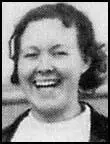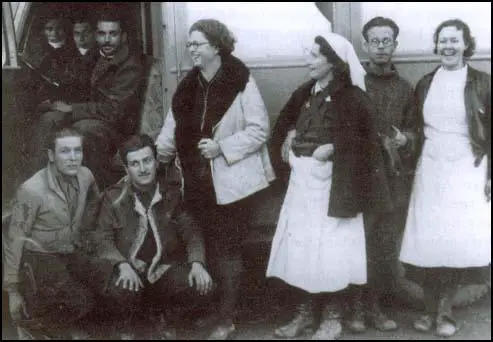Lilian Urmston

Lilian Buckoke, the daughter of a steel worker, was born in Stalybridge on 7th June, 1915. She was an intelligent girl and she won a scholarship to a local secondary school but her father could not afford for her to go.
Her parents were both very religious and as a young woman she taught at the Sunday School. She later recalled: "My father was always anxious to instill into me that I was a descendent of Jack Cade, the rebel."
After leaving school Lilian worked in an office before she started nurse training at a local hospital. She qualified as a State Registered Nurse before taking courses on tropical fevers and midwifery. It was while working as a midwife that she saw conditions of extreme poverty. During this period she developed a social conscience and became involved in politics.
In the 1930s she was radicalized by the Great Depression. She observed people queuing outside the Labour Exchange in Stalybridge: "They were standing there looking hungry, depressed and ashamed, and I used to feel ashamed that I'd even glanced at them because I felt I was adding to their misery. And then I heard stories of the way they were treated, when the money was pushed across the counter it was often pushed so that the coins fell onto the floor, when the man had to touch his cap and pick them up."
Lilian was working as a Staff Nurse in the Lake District when the Spanish Civil War began. She immediately attempted to join the British Medical Aid Unit that was providing support for the Republican Army and the International Brigades. At first she was rejected because she was not a member of the Communist Party of Great Britain. However, Lilian was eventually accepted and she arrived in Spain in June 1937.

Lilian worked on the Aragon front at Teruel and in the railway tunnel near Flix. This involved nursing wounded troops at the Battle of Ebro: "We moved forward to just a few kilometres from the river Ebro. We took a huge cave - our first bomb-proof hospital, and installed 120 beds. For a few days the wounded poured in. Ambulances were continually arriving, day and night. Then rumours began to circulate that hundreds of wounded were lying on the other side of the river, and could not be brought across. The fascist aviators were bombing the pontoon bridges all day long, and all night long our fortification battalions were repairing them. Also, almost all the territory which we had taken was within range of the fascist artillery. We were all sick with horror at the thought of this unnecessary suffering, and begged our chiefs to send us across the river."
Lilian remained in Spain until the International Brigades were withdrawn at the end of 1938. She was held in the camps in France with a group of Spanish medical staff until Rosita Davson arranged for her release.
During the Second World War Lilian was an army nursing officer with the British Army. She was evacuated at Dunkirk. Later she served as a nurse in Egypt, Syria, Sicily and Italy. Lilian was badly hurt by shell fire in Anzio. She suffered spinal injuries from which she never fully recovered. While she was in hospital she met her future husband. They were married in 1945.
After the war Lilian Urmston worked as a journalist for several years. She then worked in Kuala Lumpur with her husband. They also helped prostitutes in Singapore to form a union.
Lilian Urmston died in 1990.
Primary Sources
(1) Lilian Urmston, was interviewed about her experiences at Ebro during the Spanish Civil War in October 1938.
We moved forward to just a few kilometres from the river Ebro. We took a huge cave - our first bomb-proof hospital, and installed 120 beds. For a few days the wounded poured in. Ambulances were continually arriving, day and night. Then rumours began to circulate that hundreds of wounded were lying on the other side of the river, and could not be brought across. The fascist aviators were bombing the pontoon bridges all day long, and all night long our fortification battalions were repairing them. Also, almost all the territory which we had taken was within range of the fascist artillery. We were all sick with horror at the thought of this unnecessary suffering, and begged our chiefs to send us across the river ...
The following morning, at 1 a.m., the Spanish Medical Director told me to pack equipment and be ready in 20 minutes to move across the river. I hurriedly issued orders, and in a very short time we were ready. I was to go, along with Dr Jolly, the Spanish doctors and sanitarios (medical auxiliaries), and set up as large a hospital as possible.
Just as dawn was breaking, we were crossing the newly-repaired pontoon bridges. We had just reached the other side, and our ambulances were toiling along the hastily prepared road, when we heard the familiar cry of 'Aviacion!' Ambulances were pulled up at the side of the road, under the shelter of the cliffs - and we lay in ditches, tense with expectation and apprehension. But it was only our usual early morning caller, the observation plane. We continued our journey for exactly 25 minutes, and then twelve huge bombers came into sight. We all pulled into an olive grove, just off the road, and hastily camouflaged our ambulances and autochir. Then, a brief whistle - no movement - and we all lay down under trees and bushes. The planes bombed all along the river banks, and roads and crossroads. Our anti-aircraft guns were going magnificently, and managed to bring down one bomber.
Suddenly came the familiar rat-tat-tat of machine guns - they were strafing the helpless people who happened to be anywhere in view. At last came a number, six I think, of our pursuit planes, and engaged in a glorious dog fight. It is a most stimulating sight,this, to see our small planes tackling these gigantic bombers. After an hour of this the bombers soared higher, and disappeared. We were all relieved. And weren't we hungry! Rations of bully beef and bread were issued, then we again moved off. At 2 p.m. we reached Santa Magdalena, a huge white hermitage set high on the hills. Rather a landmark - but the only available habitation. We cheerfully acted as charwomen, then quickly set up a hospital. We were again interrupted by a heavy bombardment - luckily the bombs did not fall too near. By 11 p.m. our hospital was complete, and a steady stream of ambulances started to arrive. We only received the more severely wounded cases and our beds were quickly filled.

